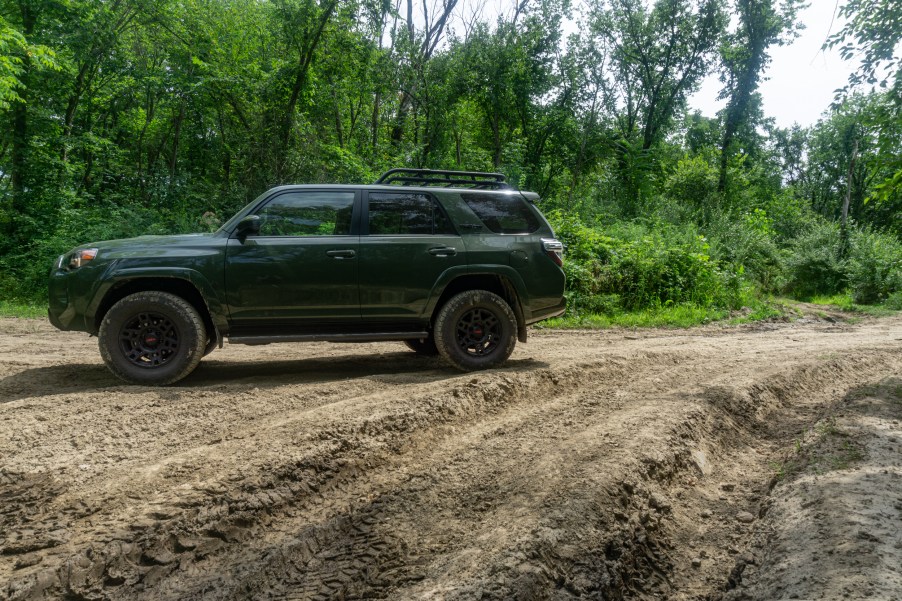
The 2020 Toyota 4Runner TRD Pro: Where Old-School Meets the New
While a few vehicles, such as the Porsche Cayenne, call themselves SUVs, they’re technically crossovers. The 2020 Toyota 4Runner TRD Pro, however, with its body-on-frame design, is an SUV. One that, despite some recent updates, hasn’t changed much over the years. It’s an approach that gives the 4Runner TRD Pro a few flaws, but also a few charms.
2020 Toyota 4Runner TRD Pro: old-school design, a touch of modern tech
Some of the 2020 Toyota 4Runner TRD Pro’s features carry over from previous years. Like the rest of the 4Runner lineup, it has a 4.0-liter V6, rated at 270 hp and 278 lb-ft. That’s linked to a 5-speed automatic and a four-wheel-drive system with a 2-speed transfer case.
Like the 2019 model, the 2020 4Runner TRD Pro rides on Fox 2.5” remote-reservoir shocks, TRD springs, and Nitto Terra Grappler all-terrain tires, Motor Trend reports. But the 2020 model has a new TRD cat-back exhaust, which is bent at 90° for better off-road capability. More on that in a moment.
The biggest change for the 2020 model year is with the Toyota 4Runner’s interior technology, Roadshow reports. The body-on-frame SUV now comes standard with Apple CarPlay and Android Auto, as well as an 8” infotainment touchscreen. It also has Toyota’s ADAS suite, which features adaptive cruise control, lane-departure alert, and automatic emergency braking. Plus, the 2020 4Runner TRD Pro now has push-button start, and its instrument cluster has a new configurable digital display.

In TRD Pro trim, the Toyota 4Runner also comes with heated power-adjustable front seats, GPS navigation, multiple USB and 12V power outlets, a sunroof, and a 165-lb-rated roof rack. And while it doesn’t offer 3rd-row seating, it can be fitted with a slide-out rear cargo floor that doubles as a seat.

But the premium over a base 4WD Toyota 4Runner—the TRD Pro starts at $49,865—gets you more than just that. That’s because, at heart, the 4Runner TRD Pro is made for off-roading.
The Toyota 4Runner TRD Pro is an unapologetic off-road-ready SUV
Body-on-frame SUVs, Carfax explains, have several disadvantages compared to unibody crossovers. They’re heavier, not quite as safe, and they typically don’t ride as quietly or as comfortably. However, when it comes to towing, hauling, and especially off-roading, their extra rigidity and articulation give them an edge.
The 2020 Toyota 4Runner TRD Pro, though, has more than just its body-on-frame design to fall back on. In addition to its 4WD, suspension, and tires, it has an aluminum skid plate and a locking rear differential. With its ‘bent’ exhaust and trim-specific bumpers, it has a 26° departure angle, the best departure of any TRD Pro vehicle, Motor1 reports. It also has 9.6” of ground clearance, a 33° approach angle, and a 19.8° break-over angle, Road & Track reports.

On top of that, the 4Runner TRD Pro comes with Multi-Terrain Select, which adjusts the 4WD system, throttle response, and brake-based torque vectoring, Gear Patrol reports. The SUV also comes with a form of off-road cruise control called Crawl Control. If you’re new to off-roading, all you’ll need to do is shift into 4Lo, lock the rear differential, set the driving mode, and turn on Crawl Control. After that, all you need to do is steer.
The on-pavement pros

The Jeep Wrangler Rubicon may have better off-road angles, as well as solid axles and disconnecting sway bars for rock-crawling. But the Wrangler isn’t as refined on-road as the Toyota 4Runner.

True, the SUV’s design means you’ll feel and hear more pothole impacts. And the tires make a subtle whine at highway speeds, Motor1 reports, which I also noticed. But the shocks and those tires make for an extremely comfortable ride. I accidentally drove over speed bumps too quickly—the only sign was a slightly larger hop.

Being an SUV, the 4Runner has plenty of interior space. It can seat 5, and hold all their hiking gear. And the rear cargo area also houses a 110V outlet. The adaptive cruise control works well at highway speeds, with a wheel-mounted button adjusting the following distance. And the lane-departure alert only sounds if you cross over the markers.
The Toyota 4Runner TRD Pro’s downsides
But these pluses come with a few minuses.
The Toyota 4Runner is a fairly large and tall vehicle; the TRD Pro is even taller, thanks to a 1” front lift. On the streets of Chicagoland, I sometimes worried I’d accidentally scrape against street-parked cars. The thick pillars can also obscure passing motorcycles and can make picking off-road sightlines difficult at times. And unlike the Tacoma TRD Pro and Land Cruiser, the 4Runner doesn’t offer obstacle-spotting cameras.
Also, while the V6 and 5-speed transmission may be reliable, they’re not particularly efficient. And those all-terrain tires don’t help here, either. The EPA rates the 4Runner TRD Pro at 16 mpg city and 19 mpg highway, Motor1 reports. Over 238 miles of mostly highway driving, I averaged 16.76 mpg. And at those speeds, the V6 takes on a strained and agricultural noise. It’s not bad, just ever-present, especially with the large-diameter TRD exhaust.
Plus, the TRD Pro is ultimately based on a $36,120 SUV. The interior isn’t necessarily cheap, like some claim. The plastics may be hard in places, but they feel solid. However, the volume and tuning knobs do betray their lower-price origins. And the carbon-fiber center-console trim feels a little tacky. There are crossovers at this price point with more upscale interiors.
Should you buy one?
Ultimately, I enjoyed my time with the 2020 Toyota 4Runner TRD Pro. Especially when I hit the off-road trails. But buying one as a daily-driver means understanding what kind of vehicle it is and isn’t.

If you want a comfortable city car with extra ride height and space, the 4Runner TRD Pro isn’t really for you. It’s comfortable, but it’s also just a bit too big and thirsty. A unibody crossover like the Jeep Grand Cherokee would likely do the job better. But, if you’re after an SUV that can freely transition from rocky trails to concrete highways while carrying a lot of gear, the 4Runner TRD Pro may be a perfect fit.
Follow more updates from MotorBiscuit on our Facebook page.


